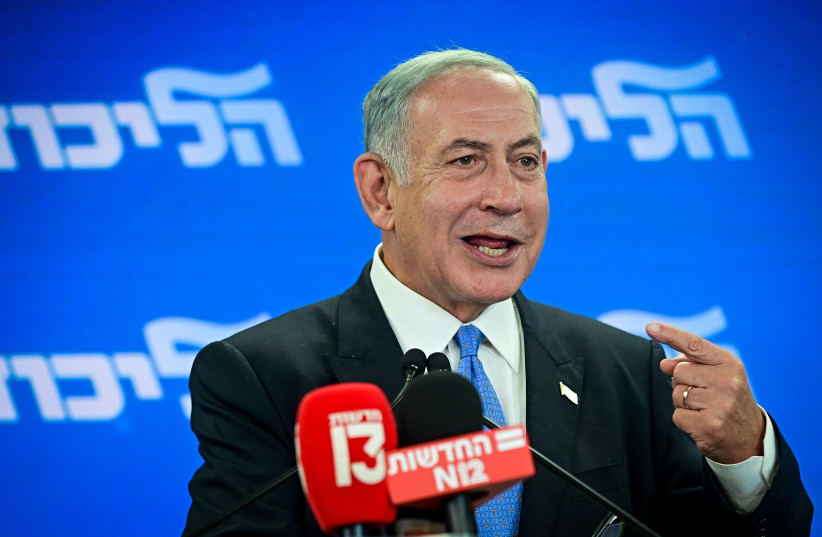Benjamin Netanyahu is back. This much we know. Yet we wait with anticipation for the results of the backroom coalition-building that happens after every election and his declaration that it will be done within two weeks indicates there is little left to do. Clearly, he spent his considerable downtime laying the groundwork to create allyship, but we see the demands from smaller parties becoming more extreme, bold and public by the day.
The general consensus is that Netanyahu was reelected not because he is uniformly beloved by the people of Israel but because Israelis long for a return to strength and stability. The recent roller coaster ride of national elections coupled with the lack of any stable government and exacerbated by corona lockdowns has left everyone in search of solid ground.
We have every confidence that Netanyahu will achieve that stability, if for no other reason than the sheer will of those factions within the coalition who wish to remain on the inside rather than out in the opposition cold, a place they know all too well.
This is only a starting point. Netanyahu has a once-in-a-lifetime opportunity to determine what mark he intends to leave behind, how history will record his legacy and which Israel he passes on to the next generation of leaders.
Here are just some of the reasons we believe Netanyahu can seize this unique moment with a final opportunity to craft his legacy:

Fear and standing up to bullies
The world, Jewish and non-Jewish, loves to see Israel as big tough guys and Israelis love to project that image. But that doesn’t make it true. The reality is, Israeli voters, said quite loudly, “We need leadership willing to stand up to bullies.” The election’s biggest wins went to those platforms willing to stand up to our enemies, both domestically and abroad, and protect Israel’s security.
This, of course, rattles Diaspora Jewry, who are collectively making a lot of noise about Israeli voters not prioritizing democracy and equality for all. They fail to recognize that Israelis live in far more fear for their existence than world opinion.
Antisemitism, primarily expressed as anti-Zionism and rising at a horrifying rate, is becoming increasingly extreme and worse, socially acceptable. With repeated anti-Israel votes at the United Nations this past week, we know who will and won’t have our back, especially when it comes to Iran. With good cause.
Netanyahu has an opportunity, yet again, to demonstrate Israel’s willingness to do what it takes to ensure its survival. This is not optional. He should be bolstered by the voters on this issue.
This means standing up to significant pressure from the US administration. While President Joe Biden is undoubtedly a Zionist and personal friend to Israel, his administration’s Middle East experts are Obama-era retreads who wish to continue tough love policies when it comes to building in Judea and Samaria, responding to the Iranian threat or ceding future natural fuel revenue to Lebanon.
Jewishness of the state
The UK’s Jewish News recently published a disturbing cover depicting Smotrich and Ben-Gvir celebrating their party’s recent win under the headline, “Our Worst Fears.”
We would like to believe this does not reflect the majority of English Jewry’s hearts and minds. Certainly, people have more to fear in today’s world than 14 democratically-elected Religious Zionist seats in the next Knesset. We have to hope this is the case.
The fact is that the numbers from this month’s week’s election send two stark messages about the Israeli voting public today:
1. The country remains almost exactly split - 50/50 - on its desire for a right-wing vs. left-wing government if you count all of Israel’s citizens.
2. The people have spoken: Israel’s Jewish population demonstrated a strong preference for a right-wing government and a Jewish state. They care more about preserving the Jewishness of the state than they do about appeasing liberal Diaspora Jewry or the rest of the world. In his recent Substack essay, “The Israel We Knew is Not Gone,” Daniel Gordis says “Israelis never wanted that ‘Israel we thought we knew,’ opting instead for retaining the Jewishness of the country. Because no matter how much Israel likes to brag about democracy and freedom, inclusivity and tolerance, both religious and secular Israelis alike are not interested in diluting what it means to be a Jewish state.”
More than most, Netanyahu has demonstrated a better understanding of and respect for the ultra-Orthodox sector than most of Israel’s leaders. Within the religious-Zionist community, however, his only point of understanding till now was related to protecting Judea and Samaria.
His support waffled on this issue, depending on the election cycle and balancing support between the Dati Leumi community and America’s administration. On anything and everything else, he has treated this sector largely as a threat to his leadership (think Naftali Bennett). Armed with intense Zionism, Jewish pride, education and military participation, he only considered them a strategic ally when it came to Judea and Samaria.
Now is the time for Netanyahu to reverse that perspective by working with this faction within his government to build a democratic, inclusive state, one that is unwavering in its Jewishness, just as voters indicated.

Healing
The pandemic contributed to Israel’s internal instability but also had a lasting effect on feelings of alienation from the Jewish Diaspora. The problem has also been exacerbated by a strong push to reform Israel’s status quo on religious pluralism to more closely reflect liberal policies in the US. This failed miserably and loudly signaled that we don’t want their Jewish solutions here. Agree or not, the decade-long attempt at dialogue has only gotten worse, not better.
The prime minister can’t fix this problem. He can, however, take it seriously enough to make it a new pressing mandate, assigning ministers and parties who were elected by the people. At the same time, he must take into account, with seriousness and gravity, the hurt and disappointment felt by Diaspora Jewry, listen with compassion and address their concerns.
Before the fall of his last Knesset, some baby-steps were taken to find a voice-without-a-vote solution that would work for everyone. The potential to heal is real, if our leadership can show backbone and emotional intelligence.
Israel’s future
It’s time to create a strategic vision for Israel’s future. Of all people, Netanyahu built a successful career on managing crises as they arose, responding to each mounting challenge as needed. It’s truly impressive. Yet, as we approach Israel’s 75th birthday, this strategy - or lack thereof - just won’t do.
Netanyahu needs to seize the opportunity to inspire and empower the nation to envision the future we want with a plan for how to get there. To quote Ambassador David Friedman’s parting words at a recent Tikvah Fund conference, “Israel, you now have to decide who you want to be when you grow up. Because if you don’t, your enemies will decide that for you.”
There are many good sincere people working on ideas and discussing how to reach a strategic vision for Israel’s second century. But before we can do that, we need to switch our thinking from a reactive model to a proactive one and groom leaders who give inspiration and have the vision to dream big for what is possible. We need to be discussing who and what we want to be.
Israel’s leader can take the reins, help foment a shift in mentality and have that become part of his legacy.
Cultivation of leadership
Over the course of 30-plus years, Netanyahu has certainly demonstrated his mastery of rising to and staying in power. While somewhat impressive and probably good for the country, Israel has paid a price.
How so? Netanyahu’s career is marked by, among other things, the squashing of alternative leadership. He remained king of the hill by being a strong and effective leader but also by effectively neutralizing any up-and-coming talent he saw as a threat to his position, leaving a gaping hole in grooming any potential successors.
Netanyahu now has a singular opportunity to change the narrative and empower the next generation of leaders. Remaining strong and confident, while having the inner strength and confidence to cultivate a successor would indeed be a lasting gift to Israel and the Jewish people.
The writer is the director of public affairs and communications at Aish Global, the owner of Moore Connected Communications and is a founding board member of Israel in 2048.
